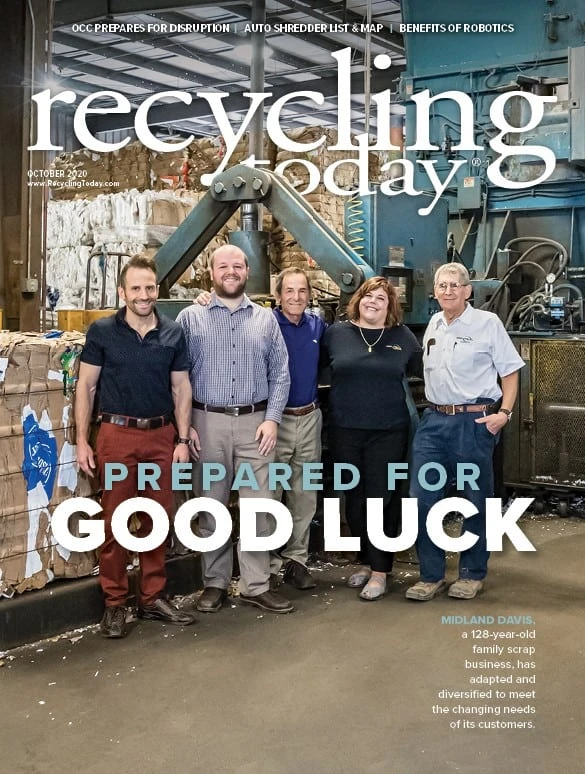Organizations announce plastic recycling initiative
Several nongovernmental organizations are spearheading an initiative called the United States Plastics Pact, which aims to make all plastic packaging 100 percent reusable, recyclable or compostable by 2025.
The creation of the U.S. Plastics Pact has been jointly announced by The Recycling Partnership, based in Falls Church, Virginia; the United Kingdom-based Ellen MacArthur Foundation; and the Switzerland-based World Wildlife Fund. The pact was announced at an online event hosted by Oakland, California-based Greenbiz Circularity.
The groups call the pact “an ambitious initiative to unify more than 70 diverse public-private stakeholders—‘Activators of The Pact’—across each part of the supply and plastics manufacturing chain to rethink the way we design, use and reuse plastics in order to create a path toward a circular economy for plastic in the U.S.”
The pact has identified four goals:
- to define a list of packaging to be designated as problematic or unnecessary by 2021 and to “take measures to eliminate them by 2025;”
- to ensure that by 2025, all plastic packaging is 100 percent reusable, recyclable or compostable;
- to undertake what the pact calls “ambitious actions to effectively recycle or compost 50 percent of plastic packaging” by 2025; and
- to reach an average recycled content or “responsibly sourced bio-based content” in plastic packaging of 30 percent by 2025.
The organizers of the U.S. Plastics Pact say it was created in part because “individualized action has proven insufficient thus far in achieving significant, systemwide change. Reaching this specific vision will require new levels of innovation and collaboration from all ‘activators’ of the U.S. Plastics Pact and beyond.”
Several industry associations have joined the U.S. Plastics Pact, including the American Beverage Association and the Institute of Scrap Recycling Industries.
Companies to join the pact include plastics reprocessor PreZero US Inc., based in Los Angeles, and Kimberly-Clark, Neenah, Wisconsin.
The pact emphasizes measurable change, and PreZero US and Kimberly-Clark say they are committed to transparent, annual reporting, guided by WWF’s ReSource: Plastic Footprint Tracker, which will be used to document annual progress against the pact’s four goals. The first task of the founding “activators” of the U.S. Plastics Pact will be to establish a “roadmap” in the first quarter of 2021 to identify key milestones and national solutions to achieving the U.S. targets.
PolyQuest to expand South Carolina PET recycling operations
In response to growing demand for postconsumer recycled content plastics, PolyQuest Inc., headquartered in Wilmington, North Carolina, has announced it will invest in its polyethylene terephthalate (PET) recycling operation in Darlington, South Carolina.
Since 2006, the company has produced recycled PET (rPET) at the Darlington facility. Using either postindustrial or postconsumer PET feedstocks, PolyQuest can manufacture amorphous, crystallized and solid-state rPET resins that are either non-Food and Drug Administration (FDA) or FDA approved for food contact. Plans call for building at least one additional FDA-approved rPET line in Darlington that is scheduled to be operational by the third quarter of 2021, according to the company, which adds that the resin produced by the new line “will be of high quality and suitable for use in the vast majority of PET applications.”
John Marinelli, CEO of PolyQuest, says, “This additional investment is ultimately driven by our customers’ commitments to sustainability. They have entrusted PolyQuest with their current and future postconsumer rPET resin supply requirements. As such, we have chosen to proactively expand our recycle capabilities to support their strategic sustainability initiatives and stay ahead of the curve.”

Marinelli adds that the company has additional pelletizing capacity at the plant if it wants to add another intrinsic viscosity (IV) enhancement line.
PolyQuest also operates a reprocessing facility in Farmingdale, New York, that produces recycled flake.
“Our total corporate thermoplastics recycling capacity is approximately 150 million pounds per year, which includes postconsumer washed bottle flake plus postconsumer pelletizing and solid stating plus postindustrial pelletizing,” Marinelli says.
Recycling represents nearly 15 percent of PolyQuest’s business when its virgin thermoplastics distribution business is factored in, he says. “Consistent with our long-term vision, we would like to maintain the recycle component share of our total thermoplastics business portfolio over time.”
Marinelli says this desire could require PolyQuest to expand into recycling postconsumer polyolefins, specifically polypropylene, in the future.

Explore the October 2020 Issue
Check out more from this issue and find your next story to read.
Latest from Recycling Today
- Orion ramping up Rocky Mountain Steel rail line
- Proposed bill would provide ‘regulatory clarity’ for chemical recycling
- Alberta Ag-Plastic pilot program continues, expands with renewed funding
- ReMA urges open intra-North American scrap trade
- Axium awarded by regional organization
- Update: China to introduce steel export quotas
- Thyssenkrupp idles capacity in Europe
- Phoenix Technologies closes Ohio rPET facility





